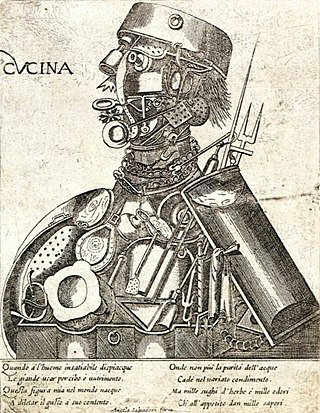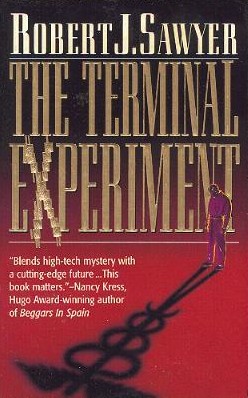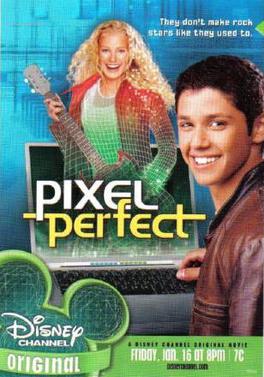The Chinese room argument holds that a computer executing a program cannot have a mind, understanding, or consciousness, regardless of how intelligently or human-like the program may make the computer behave. The argument was presented in a 1980 paper by the philosopher John Searle entitled "Minds, Brains, and Programs" and published in the journal Behavioral and Brain Sciences. Before Searle, similar arguments had been presented by figures including Gottfried Wilhelm Leibniz (1714), Anatoly Dneprov (1961), Lawrence Davis (1974) and Ned Block (1978). Searle's version has been widely discussed in the years since. The centerpiece of Searle's argument is a thought experiment known as the Chinese room.

The Moon Is a Harsh Mistress is a 1966 science fiction novel by American writer Robert A. Heinlein about a lunar colony's revolt against absentee rule from Earth. The novel illustrates and discusses libertarian ideals. It is respected for its credible presentation of a comprehensively imagined future human society on both the Earth and the Moon.

Feersum Endjinn is a science fiction novel by Scottish writer Iain M. Banks, first published in 1994. It won a British Science Fiction Association Award in 1994.

Mind uploading is a speculative process of whole brain emulation in which a brain scan is used to completely emulate the mental state of the individual in a digital computer. The computer would then run a simulation of the brain's information processing, such that it would respond in essentially the same way as the original brain and experience having a sentient conscious mind.
A brain transplant or whole-body transplant is a procedure in which the brain of one organism is transplanted into the body of another organism. It is a procedure distinct from head transplantation, which involves transferring the entire head to a new body, as opposed to the brain only. Theoretically, a person with complete organ failure could be given a new and functional body while keeping their own personality, memories, and consciousness through such a procedure. Neurosurgeon Robert J. White has grafted the head of a monkey onto the headless body of another monkey. EEG readings showed the brain was later functioning normally. Initially, it was thought to prove that the brain was an immunologically privileged organ, as the host's immune system did not attack it at first, but immunorejection caused the monkey to die after nine days. Brain transplants and similar concepts have also been explored in various forms of science fiction.

Computer simulation is the running of a mathematical model on a computer, the model being designed to represent the behaviour of, or the outcome of, a real-world or physical system. The reliability of some mathematical models can be determined by comparing their results to the real-world outcomes they aim to predict. Computer simulations have become a useful tool for the mathematical modeling of many natural systems in physics, astrophysics, climatology, chemistry, biology and manufacturing, as well as human systems in economics, psychology, social science, health care and engineering. Simulation of a system is represented as the running of the system's model. It can be used to explore and gain new insights into new technology and to estimate the performance of systems too complex for analytical solutions.

Moving Mars is a science fiction novel written by Greg Bear. Published in 1993, it won the 1994 Nebula Award for Best Novel, and was also nominated for the 1994 Hugo, Locus, and John W. Campbell Memorial Awards, each in the same category. The main focus of Moving Mars is the coming of age and development of Casseia Majumdar, the narrator, as political tensions over revolutionary scientific discoveries build between Earth and Martian factions, and Mars tries to unify itself.
A reverse Turing test is a Turing test in which failure suggests that the test-taker is human, while success suggests the test-taker is automated.

The Thirteenth Floor is a 1999 science fiction film written and directed by Josef Rusnak and produced by Roland Emmerich’s Centropolis Entertainment. Loosely based on Daniel F. Galouye’s 1964 novel, Simulacron-3, it is a remake of Rainer Werner Fassbinder’s 1973 miniseries World on a Wire. The film stars Craig Bierko, Gretchen Mol, Armin Mueller-Stahl, Vincent D'Onofrio, and Dennis Haysbert. In 2000, The Thirteenth Floor was nominated for the Saturn Award for Best Science Fiction Film but lost to The Matrix.

Demon Seed is a 1977 American science fiction–horror film directed by Donald Cammell. It stars Julie Christie and Fritz Weaver. The film was based on the 1973 novel of the same name by Dean Koontz, and concerns the imprisonment and forced impregnation of a woman by an artificially intelligent computer. Gerrit Graham, Berry Kroeger, Lisa Lu and Larry J. Blake also appear in the film, with Robert Vaughn uncredited as the voice of the computer.

"Upon the Dull Earth" is a fantasy short story by American writer Philip K. Dick, first published in November 1954 in Beyond Fantasy Fiction.

The Terminal Experiment is a science fiction novel by Canadian writer Robert J. Sawyer. The book won the 1995 Nebula Award for Best Novel, and was nominated for the Hugo Award for Best Novel in 1996. Sawyer received a writer's reserve grant from the Ontario Arts Council in 1993 in support of his writing the novel.

Pixel Perfect is a 2004 American science fiction comedy film released as a Disney Channel Original Movie. It aired in the United States on January 16, 2004, and in the United Kingdom on January 21, 2004.
The philosophy of artificial intelligence is a branch of the philosophy of mind and the philosophy of computer science that explores artificial intelligence and its implications for knowledge and understanding of intelligence, ethics, consciousness, epistemology, and free will. Furthermore, the technology is concerned with the creation of artificial animals or artificial people so the discipline is of considerable interest to philosophers. These factors contributed to the emergence of the philosophy of artificial intelligence.

Corrector Yui is a Japanese anime television series created by Kia Asamiya. The anime series was produced by Nippon Animation and broadcast on NHK Educational TV from 1999 to 2000. It was licensed for North American release by Viz Media. This series has aired on Cartoon Network outside the United States.

Timewyrm: Genesys is an original Doctor Who novel, published by Virgin Publishing in their New Adventures range of Doctor Who novels. It was the first book in that series, and was thought of by some fans as a continuation of the television series; in effect, a Season 27 to follow the televised Season 26.
The simulation hypothesis proposes that what we experience as the world is actually a simulated reality, such as a computer simulation in which we ourselves are constructs. There has been much debate over this topic in the philosophical discourse, and regarding practical applications in computing.
"Mimsy Were the Borogoves" is a science fiction short story by Lewis Padgett, originally published in the February 1943 issue of Astounding Science Fiction Magazine. It was judged by the Science Fiction Writers of America to be among the best science fiction stories written prior to 1965 and included in the anthology The Science Fiction Hall of Fame, Volume One, 1929–1964. In 2007, it was loosely adapted into a feature-length film titled The Last Mimzy. The title of the original short story quotes a verse from "Jabberwocky", a poem found in the novel Through the Looking-Glass by author Lewis Carroll.

"Forest of the Dead" is the ninth episode of the fourth series of the British science fiction television series Doctor Who. It was first broadcast by BBC One on 7 June 2008. It is the second of a two-part story; the first part, "Silence in the Library", aired on 31 May; it was Moffat's last written story before replacing Russell T Davies as head writer and showrunner starting from the fifth series in 2010.

Mind of My Mind (1977) is a science fiction novel by American writer Octavia E. Butler. Mind of My Mind is the prequel to Butler's novel Patternmaster, and is the second novel in the Patternist series.













